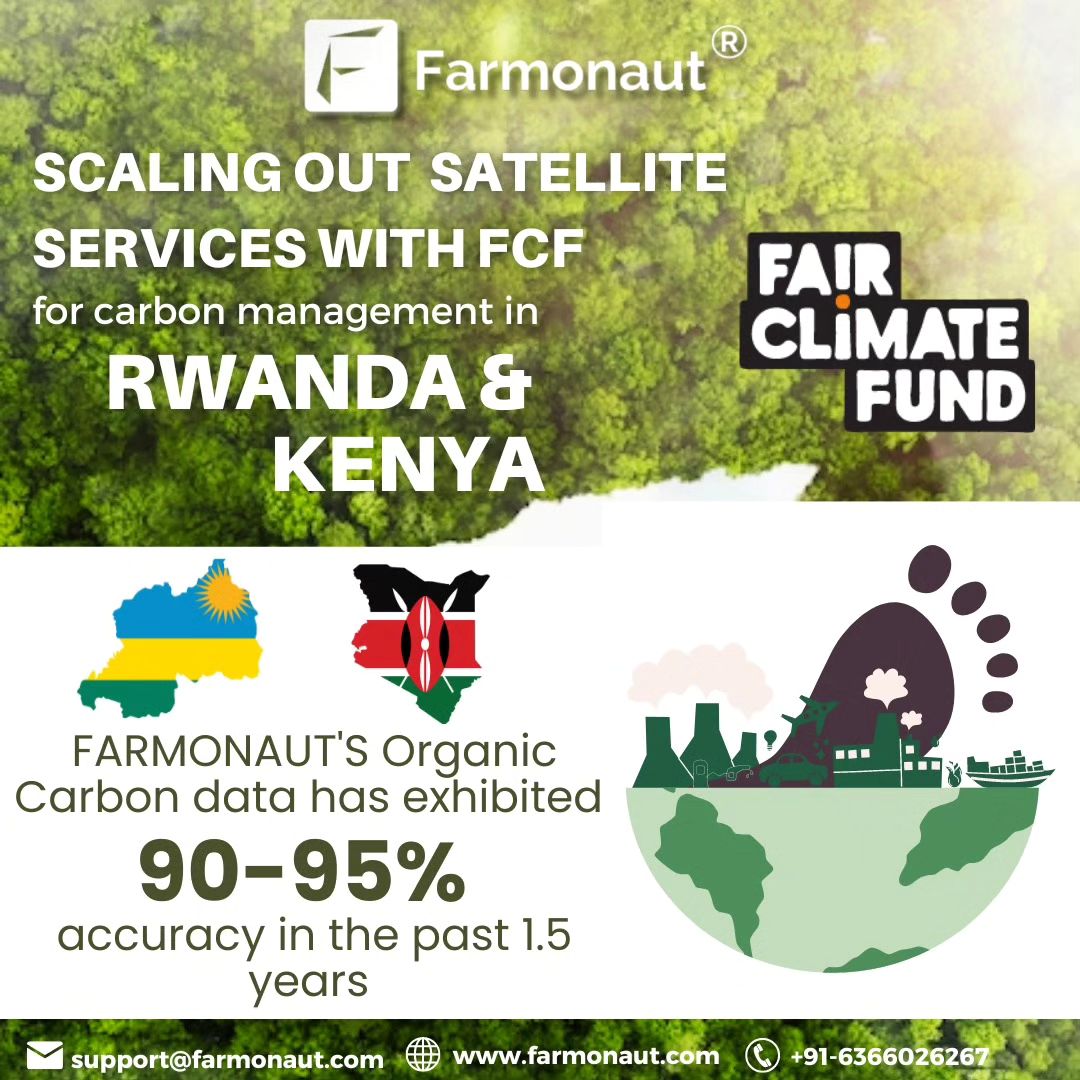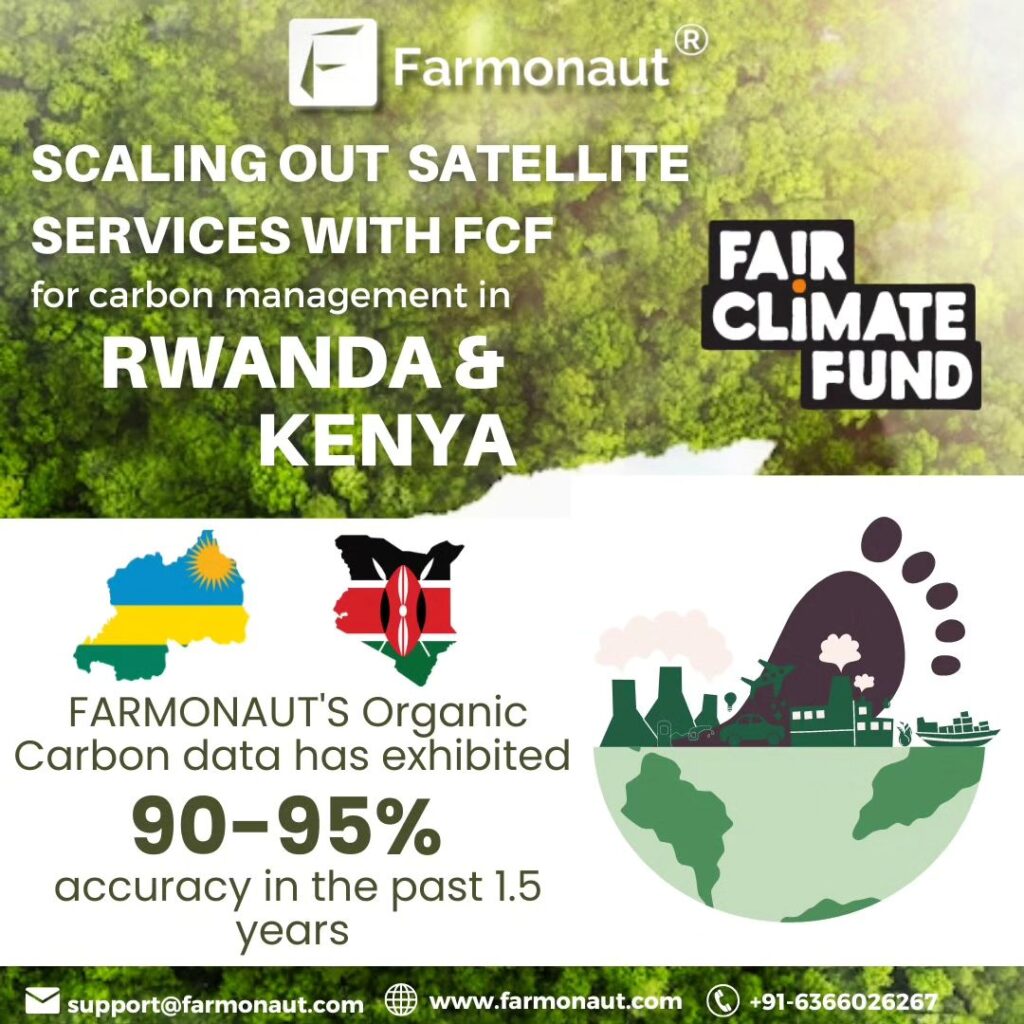Farmonaut’s Collaboration with Fair Climate Fund: Revolutionizing Carbon Management in Rwanda and Kenya

We at Farmonaut are thrilled to announce our groundbreaking collaboration with the Fair Climate Fund, Netherlands, in scaling out our satellite services for carbon management in both Rwanda and Kenya. This partnership marked a significant milestone in our journey towards sustainable agriculture and effective climate change management.
The Power of Collaboration: Farmonaut and Fair Climate Fund
For 18 months, the Fair Climate Fund had been leveraging our carbon data to drive their initiatives. This collaboration not only expanded our reach but also validated the effectiveness of our satellite-based solutions in real-world scenarios.
Our shared goal was simple yet profound: to harness the power of advanced satellite technology to make an impactful contribution to climate change management and sustainable agriculture. This partnership exemplified how technology and environmental consciousness can work hand in hand to create a more sustainable future.
Mapping Success: Our Progress in Rwanda and Kenya
We’re pleased to share that farms in Rwanda and Kenya have been successfully mapped using our satellite technology. This mapping process is crucial for several reasons:
- It provides a comprehensive overview of agricultural lands in these regions
- It allows for precise monitoring of carbon sequestration in soils
- It enables targeted interventions for improving soil health and agricultural productivity
The successful mapping of these farms is just the beginning. We’ve generated our first comprehensive report, which has been met with overwhelmingly positive feedback. This report serves as a testament to the accuracy and reliability of our satellite-based carbon management solutions.
Unparalleled Accuracy: Farmonaut’s Organic Carbon Data
One of the most exciting aspects of this collaboration has been the validation of our organic carbon data. According to the ground truthing conducted by the Fair Climate Fund over the last 1.5 years, Farmonaut’s organic carbon data has displayed a remarkable accuracy rate of 90-95%.
This high level of accuracy is crucial for several reasons:
- It provides farmers and policymakers with reliable data for decision-making
- It enhances the credibility of carbon credit schemes and sustainability initiatives
- It allows for more precise monitoring of soil health and carbon sequestration efforts
The Importance of Organic Carbon in Soil
Before we delve deeper into our collaboration and its implications, it’s essential to understand why organic carbon in soil is so crucial. The importance of organic matter in the soil cannot be overstated, especially in the context of sustainable agriculture and climate change mitigation.
Carbon Organic: The Foundation of Soil Health
Carbon organic, or organic carbon, is a vital component of soil organic matter. It plays a crucial role in several soil functions:
- Improving soil structure and water retention capacity
- Enhancing nutrient availability for plants
- Supporting beneficial soil microorganisms
- Increasing soil’s resistance to erosion
Carbon in Soil Benefits
The carbon in soil benefits extend far beyond just improving soil health. Some of the key advantages include:
- Climate Change Mitigation: Soil acts as a carbon sink, helping to reduce atmospheric CO2 levels
- Enhanced Crop Productivity: Higher organic carbon content leads to better crop yields
- Improved Water Management: Organic carbon increases soil’s water-holding capacity
- Reduced Need for Chemical Inputs: Healthy soils require fewer fertilizers and pesticides
Organic Carbon Content in Soil: A Key Indicator
The organic carbon content in soil is a crucial indicator of soil health and fertility. Our satellite-based monitoring system allows for accurate measurement of this vital parameter, enabling farmers and policymakers to make informed decisions about land management practices.
Remote Sensing for Agriculture: Farmonaut’s Approach
Remote sensing for agriculture has revolutionized the way we monitor and manage agricultural lands. At Farmonaut, we’ve taken this technology to the next level by integrating it with advanced AI and machine learning algorithms.
Our approach to remote sensing for agriculture includes:
- High-resolution satellite imagery for precise field mapping
- Multispectral analysis for assessing crop health and soil conditions
- AI-powered interpretation of satellite data for actionable insights
- Regular monitoring to track changes over time
This comprehensive approach allows us to provide accurate, timely, and actionable data to our partners and clients.
Farmonaut’s Satellite System vs. Drone and IoT-based Farm Monitoring
While drone and IoT-based farm monitoring systems have their merits, Farmonaut’s satellite system offers several distinct advantages. Here’s a comparison table to illustrate these differences:
| Feature | Farmonaut Satellite System | Drone-based Monitoring | IoT-based Monitoring |
|---|---|---|---|
| Coverage Area | Large scale (thousands of hectares) | Limited (tens of hectares per flight) | Limited to sensor placement |
| Frequency of Data Collection | Regular (every few days) | On-demand (requires manual flights) | Continuous |
| Initial Setup Cost | Low | High (drone purchase and training) | High (sensor purchase and installation) |
| Operational Complexity | Low (automated) | High (requires skilled operators) | Medium (requires maintenance) |
| Data Processing | Automated with AI | Often manual or semi-automated | Automated but limited in scope |
| Scalability | Highly scalable | Limited by equipment and personnel | Limited by sensor deployment |
The Future of Carbon Management in Agriculture
Our collaboration with Fair Climate Fund in Rwanda and Kenya is just the beginning. We envision a future where satellite-based carbon management becomes an integral part of sustainable agriculture worldwide. Here’s how we see this technology shaping the future:
- Precision Carbon Farming: Farmers will be able to optimize their practices for maximum carbon sequestration while maintaining high productivity.
- Carbon Credit Markets: Accurate measurement of soil organic carbon will facilitate more robust and reliable carbon credit schemes.
- Policy Formulation: Governments will have access to real-time data for formulating evidence-based agricultural and environmental policies.
- Climate Change Mitigation: Large-scale monitoring of soil carbon will contribute significantly to global efforts to combat climate change.
- Sustainable Supply Chains: Companies will be able to verify the sustainability claims of their agricultural suppliers more easily.
Join the Agricultural Revolution with Farmonaut
Are you interested in leveraging the power of satellite technology for sustainable agriculture and carbon management? Farmonaut offers a range of solutions tailored to various needs:
- For individual farmers: Download our Android app or get it on iOS
- For businesses and organizations: Explore our web application
- For developers: Check out our API documentation and developer resources
Frequently Asked Questions (FAQ)
Q: What is Farmonaut?
A: Farmonaut is a pioneering agricultural technology company that offers advanced, satellite-based farm management solutions. Our mission is to make precision agriculture affordable and accessible to farmers worldwide.
Q: How accurate is Farmonaut’s organic carbon data?
A: According to ground truthing conducted by the Fair Climate Fund, Farmonaut’s organic carbon data had displayed an accuracy rate of 90-95% for 1.5 years.
Q: What services does Farmonaut offer?
A: Farmonaut offers a range of services including real-time crop health monitoring, AI-based advisory systems, blockchain-based traceability, and resource management tools.
Q: How does Farmonaut’s technology benefit farmers?
A: Our technology helps farmers make informed decisions about irrigation, fertilizer usage, and pest management, ultimately optimizing crop yields and reducing resource wastage.
Q: Can Farmonaut’s services be used for carbon credit schemes?
A: Yes, our accurate measurement of soil organic carbon can facilitate more robust and reliable carbon credit schemes.
Q: How does Farmonaut contribute to sustainable agriculture?
A: By providing precise data on soil health and crop conditions, Farmonaut enables farmers to adopt more sustainable practices, reduce input use, and improve overall farm efficiency.
Q: Is Farmonaut’s technology suitable for small-scale farmers?
A: Absolutely. We’ve designed our solutions to be affordable and accessible to farmers of all scales, from small individual farms to large agricultural enterprises.
Q: How can I start using Farmonaut’s services?
A: You can start by downloading our mobile app, exploring our web application, or contacting us directly for customized solutions.
Conclusion: Embracing a Sustainable Future
Our collaboration with Fair Climate Fund in Rwanda and Kenya marks a significant step towards a more sustainable and data-driven agricultural future. By harnessing the power of satellite technology, AI, and blockchain, we’re not just monitoring carbon in soil – we’re paving the way for a revolution in sustainable agriculture.
As we continue to expand our services and improve our technology, we remain committed to our core mission: making precision agriculture accessible to all, promoting sustainable farming practices, and contributing to global efforts in climate change mitigation.
Join us in this exciting journey towards a greener, more sustainable future. Whether you’re a farmer, an agribusiness, a policymaker, or simply someone passionate about sustainable agriculture, Farmonaut has the tools and solutions to help you make a difference.
Ready to take the next step? Contact us today!
- 📩 Email: [email protected]
- 📞 Phone: +91-6366026267
Together, we can revolutionize agriculture, one satellite image at a time.
